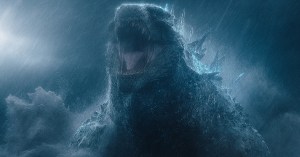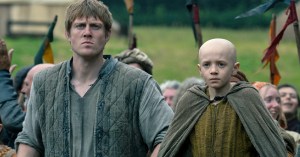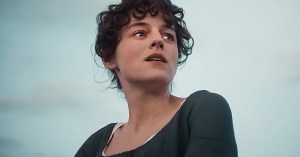WandaVision’s Sitcom Sets Hold Plenty of Easter Eggs for the MCU
Production designer Mark Worthington says there’s very little random about the ever-changing Westview home.
Movies in the Marvel Cinematic Universe are vibrant pops of color. Iron Man’s crimsons and golds or the Guardians of the Galaxy’s blues, greens, and purples blur and swirl across the nearly every frame, giving audiences a sensory overload as they watch their heroes battle for good over evil.
So how did the MCU start the television section of its Phase Four chapter? With a black-and-white sitcom, naturally.
WandaVision, created by Jac Schaeffer, is ostensibly about the quiet, domestic bliss of telepath Wanda Maximoff / Scarlet Witch (Elizabeth Olsen) and synthezoid Vision (Paul Bettany) after their lives as Avengers. Premiering January 15 on Disney+, the show opened with the two living a The Dick Van Dyke Show–inspired dream existence of dinner parties and wacky neighbors. It has since bounced forward to different eras of TV as audiences (maybe) get closer to the truth of how the duo might actually be living in a The Stepford Wives version of suburbia — especially since, well, he’s dead.

(Photo by Disney+)
WandaVision has been a hit with critics and audiences. The first season is Certified Fresh with a 93% Tomatometer rating and an 80% audience score.
But what do these design aesthetics all mean? How do they fit into the larger MCU story? To try to get to that, we talked to production designer Mark Worthington, who explained that the sets and dialogue aren’t supposed to be “exactly like any other sitcom set from the ’50s [or another era].” He said his hope, however, is that “it evokes that feeling.”
“It’s more about a sort of memory, in a certain way. What is our memory of those sitcoms? What, as an audience, what would help cue that?” he explained.
This is true for both the audience watching WandaVision who may spot similarities to programs they grew up watching either in real time or in reruns on channels like Nick At Nite and for a lot of the characters who have no choice but to follow orders not to change that channel.

(Photo by Marvel Studios)
The sets are also meant to evoke the emotions of the story. An example: The third episode, entitled “Now in Color,” blasts Wanda and Vision into the 1970s and a The Brady Bunch–style ranch house, complete with wood paneling and a sunken living room. It may seem to be one of the happiest episodes because this is when Wanda and Vision welcome their twins.
“Obviously, the content of the episode drives that as well,” Worthington said. “It’s colorful, it’s very ’70s era, and, yeah, there’s this fun positive thing that happens in the episode. So all that tracks really well.”
But don’t get too distracted by the bright and shiny nostalgia. That episode also plays up the false domesticity of The Brady Bunch, with its fake, fenced-in lawn and happy homemaker lifestyle (aside from some screaming and a burst water pipe, Wanda continues early TV’s tradition of having one nice and tidy birthing moment and is right back to a size two with a flawless blow-out by credits’ end).
And, while many new mothers are protective of their young, Wanda is particularly careful of letting anyone get close. Neighbors Herb (David Payton) and Agnes (Kathryn Hahn) aren’t allowed to know she’s pregnant and have to secretly whisper to themselves about any bizarreness in the neighborhood. Geraldine (Teyonah Parris) pays the price for getting too close to a Wanda at a vulnerable moment and gets zapped far, far away. In the actual Brady Bunch show — as well as similar ones like The Partridge Family — the emphasis was on perfect, non-messy family values (the Brady kids didn’t even have a toilet) even though off screen, those kids were not so squeaky clean.

(Photo by Marvel Studios)
Then there are the clues — or possible clues? — hidden among sets and the costumes, which are designed by Mayes C. Rubeo, and other factors. In the Halloween-themed sixth episode, Wanda’s “soccer mom” take on a simple superhero costume is the shade of a mid-life-crisis red convertible with sharp horns and a cape — the character’s original 1964 X-Men comics look complete with Jack Kirby headgear (which she explains as a traditional Sokovian fortune teller’s outfit). Is this connected to her line that she seemed to conjure this world because she “made a deal with the devil”? And how does this connect to WandaVision’s family sitcom with the upcoming seemingly more action-packed titles like The Falcon and the Winter Soldier? Judging by that show’s trailer, it will have more guns, flying and explosions than TV dinners and trick-or-treating.
“We have done Easter eggs,” Worthington said of ties back to the MCU grand plan.

(Photo by Chuck Zlotnick/Marvel Studios)
Some of those Easter eggs identified by eagle-eyed viewers include:
• the first-ever MCU references to counterterrorism / intelligence agency S.W.OR.D., which investigates extraterrestrial threats to Earth;
• a “Stark”-brand toaster; “Lagos” paper towels (to clean up Wanda’s bloody Sokovia mess?); and a nod to the midwife — a sentient cow named Bova — who delivered Wanda and her twin brother Pietro in Marvel comics;
• a commercial for a Strucker-brand watch — in the comics, Baron Wolfgang von Strucker experimented on Wanda and Pietro and is tied to terrorist organization HYDRA;
• the beekeeper uniform and multiple appearances of the hexagonal shape similar to the logo for dastardly scientific organization Advanced Idea Mechanics (A.I.M.) founded by Strucker — the Mind Stone, which brought Vision to life, also has an elongated hexagonal shape;
• a commercial for “Hydra Soak” bath powder featuring the organization’s octopus logo;
• Pietro and everything related to Pietro: references to his death by Ultron, his “recasting” to the X-Men franchise’s Pietro/Quicksilver Evan Peters (rather than Age of Ultron’s Aaron Taylor-Johnson), his Halloween costume and hair (both reflecting the character’s Marvel comics origin), the Kick-Ass connection between Peters and Taylor-Johnson, and more.
Even the WandaVision home’s address, 2800, has meaning; specifically, referencing a multiverse Earth. And who’s going to appear in 2022’s Doctor Strange in the Multiverse of Madness? Wanda Maximoff, that’s who.
Worthington said that the Easter egg ideas have grown organically from the scripts or may have been brought in by himself or by longtime MCU prop master Russell Bobbitt, who is also the prop master on upcoming MCU shows The Falcon and the Winter Soldier, Loki, Ms. Marvel, and Hawkeye.
Worthington knows something about managing audiences’ expectations. His credits include the two-part premiere of ABC’s Lost and several chapters of the FX anthology, American Horror Story. He said he did the first episode of CBS All Access’ Star Trek: Discovery feeling like he “was definitely going to have a band of people with torches and pitchforks outside my house” if he didn’t do the franchise justice.
But he finds joy in seeing that “people make up their own versions of that and see things that we may not even have planned … that’s perfect valid,” he said. “Whether we absolutely plan everything or not is actually not really the point; [it’s] if the fans begin to create an idea out of that.”





